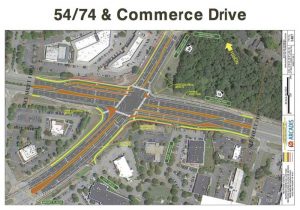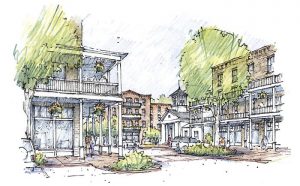Center for Individual Freedom decries city decision to borrow $3.2 million to finance broadband start-up, says most government-owned cable ventures lose money
Peachtree City is going into the broadband business and will be outfitting city-owned facilites with the service. The city will be targeting large, high-end industrial and commercial users. The new network was approved on Sept. 17 by unanimous vote.
The move has drawn outside criticism from a Republican-leaning conservative organization, the Center for Individual Freedom, based in Alexandria, Va.
In an email last week, CFIF called the decision a “boondoggle” that “will cost millions of your hard-earned tax dollars and put the city’s bond rating and other important services at risk.”
Some on the council prior to the unanimous vote noted that the project would present a risk and would depend on securing and maintaining the necessary customer base. In the end, constructing and operating the service outweighed the risk.
“Not meeting projections is my greatest concern,” Councilman Eric Imker said during the discussion.
Community Broadband LLC owner Allen Davis noted that the largest concern is if the council believes the project is feasible. Davis said research had identified 76 potential high-end broadband users.
A survey of those potential customers indicated that a sufficient number would sign on and make the city-operated network economically feasible, city staff said.
“Do we believe we can get 12 of those (the start-up number needed) as customers?” Davis asked. “I’m surprised the demand is so great. I believe we can hit and exceed that number.”
CFIF charged that more than seven out of 10 government-owned networks “fail to make an annual profit. … Peachtree City has better things to spend its money on than a service the private sector ably provides,” noting that the council “has already voted this year to increase taxes on residents, collecting an extra $645,000.”
Following up on the topic, Imker and Councilman Mike King mentioned, and Davis agreed, that a broadband provider could attempt to lure potential customers away from the city service, but Davis noted that the city’s prices would be essentially wholesale.
Another potential for untapped customers comes from the reality that the city can sell broadband service to those situated outside the city.
Whether in or outside the city, staff said the targeted customer base includes government, utility, industrial and commercial, education and medical broadband users.
The project calls for 22.54 miles of underground fiber cable that would serve city-owned facilities and the city’s high-end industrial and commercial businesses already using large quantities of broadband.
Providing the needed infrastructure would require a municipal bond-funded expense of $3.23 million, said Davis.
Payments on the 10-year bond would begin in the third year, Davis said, adding that the city would see a positive cash flow in the second year of operation.
Council during the broadband discussion on Sept. 8 was told that the initial projected 3.5 percent interest rate on the bond would likely be closer to 2 percent.
Part of the idea for having the city own the service deals with the shrinking revenue from franchise fees because broadband is considered an information service and is not required to pay a franchise fee.
What is today a $400,000 revenue source from franchise fees is projected to decrease over time. Citing an example, Finance Director Paul Salvatore said increasing numbers of residents are abandoning land lines which generate franchise fee revenues.
Meantime, the city is paying NuLink $50,000 this year for service. The bill next year will be increasing to $70,000, Salvatore said.
Those wanting residential broadband service will be in for a wait of an unknown duration since that service will be dependent on companies such as NuLink or Comcast being willing to invest what Davis said would cost $100,000 per mile to install fiber lines.
While expensive, staff said some broadband providers might find installing fiber lines economically feasible.
No one at the meeting could provide an estimate on how long it would take for residential customers to receive broadband service after other vendors piggybacked on the city network.
Imker prior to the vote said he had wanted the matter discussed Sept. 17 and a vote taken in October. With fellow council members apparently set to move ahead, Imker said he did not want to stand in the way.
The Sept. 17 presentation, discussion and vote followed a Sept. 8 workshop lasting nearly three hours where the multi-step process and business plan were detailed.
The criticism of the city decision comes from the Center for Individual Freedom, which describes itself as “a non-partisan, non-profit organization with the mission to protect and defend individual freedoms and individual rights guaranteed by the U.S. Constitution. The Center seeks to focus public, legislative and judicial attention on the rule of law as embodied in the federal and state constitutions.”
The Center financially supported various Republican candidates in elections around the country in 2010 and 2012.













Leave a Comment
You must be logged in to post a comment.